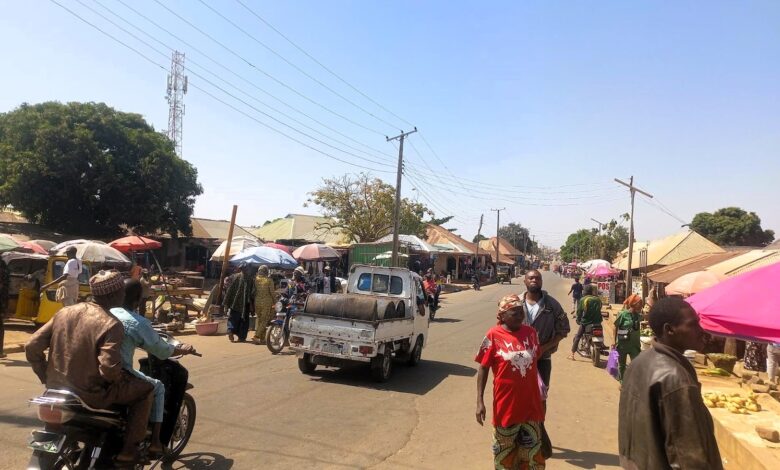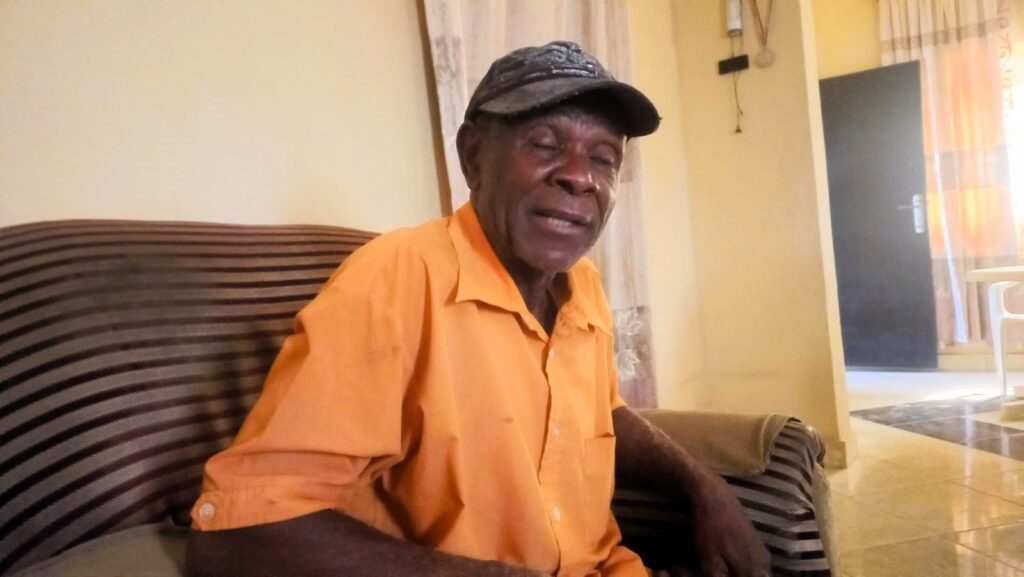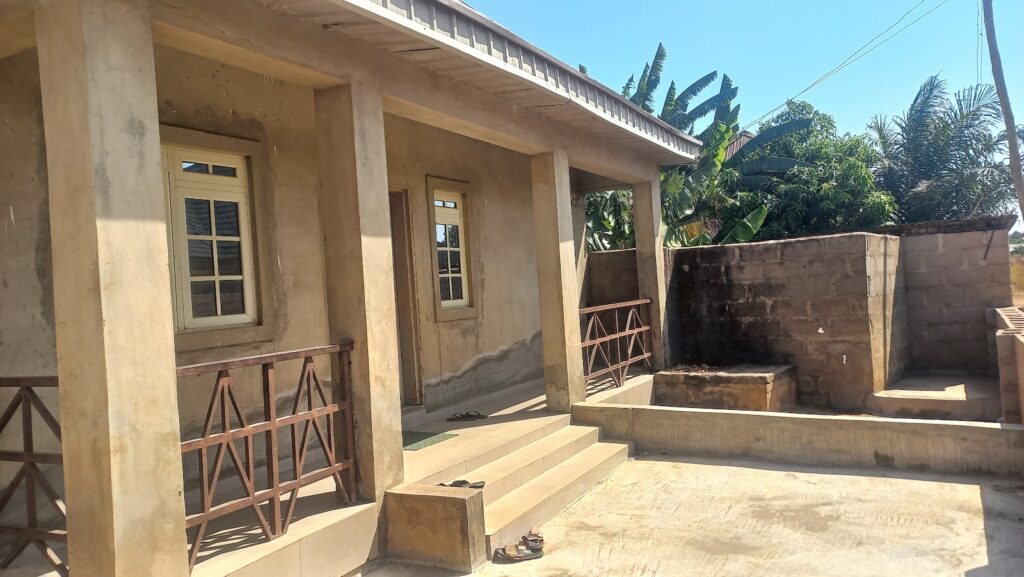Living On Edge In A Terrorised Nigerian City
The Bright Ogbuabia family are yet to enjoy the peace that comes with finally owning their own home. The violence around them has left indelible marks, and they wonder when it will all end.

The Bright Udenze Ogbuabia family had a dream: to build their own house in a city they had come to call home. Despite the long stretches of peace in Kaduna, the road to that dream was rocked by a series of crises that culminated in today’s looming terror.
“The first riot I witnessed in Kaduna was in 1987 during the regime of General Badamasi Babangida,” Ogbuabia said from his place on a couch. He was in their home in Bagodo in the Chikun area of North West Nigeria.
“After the Sharia and the Miss World crises, we even planned to leave Kaduna entirely. But it didn’t work..”
Ogbuabia was referring to the violent conflicts that erupted in 2000 over the proposed implementation of Islamic criminal law in Kaduna and in 2002, after a This Day article relating to the Miss World beauty contest scheduled to be held in the country, led to bloodletting.
Years later, the trigger for ongoing acts of terrorism in the state would be unlike anything Kaduna residents had ever witnessed.
Big dreams
Before Ogbuabia raised a family, all he had in 1978 were his dreams when he stepped foot on Kaduna soil from Abia State, South East Nigeria. “I have been in Kaduna for more than 40 years now. It has been a home and I can describe it as a very peaceful place. Then we lived in Abakpa, Kaduna North, in the midst of the Hausas,” he reminisced.
After what was popularly called the Sharia and Miss World conflict, Ogbuabia, then a family man with six children, tried to leave the city entirely. He evacuated his family, but this did not work out as he’d hoped. They lived back in Abia for a year and six months while he shuttled back and forth for business.
“We had to come back,” he said. “We were more comfortable in Kaduna.”
When the entire family returned, they moved from Abakpa in Kaduna North to Sabon Tasha in the Chikun Local Government Area (LGA). This was when the desire to own their own house became stronger.
“After praying and trusting God, we got land in Tsohon Bagado, on the outskirts of Kamazo in Chikun. In 2016, we moved in.”
Although what many Nigerians called banditry had started by then, the Ogbuabias only heard about it from afar. But things soon changed when they moved into their nearly completed home in Bagado. The comfort and peace they thought they would enjoy turned to a certain uneasiness and then quickly morphed into full-blown terror.

The episodes
The first jolt of fear that ran through the Ogbuabia family began with the kidnapping of their family friends in Unguwan Gimbiya, a not-too-distant neighbourhood in Sabon Tasha.
“The husband was kidnapped and has not been found,” he narrated. The couple were kidnapped on Dec. 20, 2021. By Dec. 24, something gruesome happened. The wife was killed and her corpse was dumped on a highway.
The terrorists called the family by phone and told them where to find her remains. The murder was meant to send a clear message — that this was what they were capable of if the ransom of ₦10 million was not paid.
“She wasn’t the only one, they killed about five captives. And these five were all Igbos,” Ogbuabia said.
The gang threatened to kill the father in three days if their demands were not met. The family sent the ransom along with three motorcycles. But their father was never returned to them and the entire family relocated to eastern Nigeria.
HumAngle had reported how terrorists gunned down two men and abducted over 50 persons in an attack in the same community on Dec. 3, 2021.
What made the Ogbuabias flee from their home was when the attacks struck close.
“When we moved, we were one of the first few people here,” Ogbuabia said, waving a hand at the still-developing area. “All these houses were not here. It was a quiet place and we had no fear because all this news of kidnapping was very far. But eventually, it began to come closer.”
The first time such abductions struck too close for comfort was when it took place at Jan Ruwa, a settlement less than three kilometres away. Many residents moved out of the area. “I know of a friend who sold his house and moved to the East,” he recalled. But the Ogbuabias decided to remain, trusting God to see them through.
Then it happened again.
Metres away from their home in Bagado, a commercial motorcyclist lost his life to kidnappers. He had driven a policewoman to her home in the area around 10 a.m. Unfortunately, upon their arrival, a gang was already stationed there, guns ready. The moment the rider’s headlights flashed at them, the kidnappers opened fire. With the motorcyclist dead, they whisked away the woman and three other residents.
Remembering the incident, Ogbuabia told HumAngle: “That day was war. We did not close our eyes that night.”
They had just said their night prayers because he has a habit of going to bed early. Shortly after, his son knocked and said a friend had posted on Facebook that there were kidnappers a few kilometres away.
“So I had to wake up. By that time, we didn’t hear gunshots. We began to call people we know. One man confirmed it and said an okada man was killed. That they are with the corpse of the man and that the kidnappers had left with some other people.”
A short while after this discussion, they began to hear gunshots. There was no telling whether it was terrorists or locals who had arms. Ogbuabia presumed there were residents shooting in the air to scare off the terrorists.
“The gunshots were all over. I urinated many times before daybreak because I couldn’t lie down to sleep. People were calling that we should leave the house. But we didn’t know what was happening outside. It was dangerous and safer to remain indoors.”

When the third episode occurred, it was around First Baptist Church, a stone’s throw from their residence. The family did not wait to let events unfold this time around.
They moved and lived in a borrowed house in Unguwan Sunday for three months. Fortunately, a relative had packed out of the house before her rent expired, and so this gave them ample time to seek refuge.
“It was only me and my wife. Chinedu had left immediately after the incident the following morning. Our last born lives with her elder sister who is married. They only visit now,” Ogbuabia explained. Since they returned to Bagado, his children prefer to stay away except for occasional visits that hardly exceed day time.
Staying despite it all
Three months after the Ogbuabias left their personal home, they returned thinking the danger was over. But this was not the case. In 2023 alone, there were more than three major terror attacks in the general area.
“Although we were not directly involved, we were in this house,” Ogbuabia pointed out. “The last incident was in December [2023].”
Between 9:30 to 10:00 p.m. in Bagado, terrorists traced a man to his house. His wife was already in bed. When he returned home, he went straight to take care of their dog. “That was when they jumped on him and took over the premises. They forced the wife out of bed. Those outside took the husband. He resisted and they shot him and took the wife away.”
The trauma caused by this tragedy forced the family to abandon their house and move to a neighbouring settlement. Such abandonment is common in parts of Kaduna and the North West. In Unguwan Babban Saura, Ayaba, Juji, Gbagyi Villa and several other communities under Chikun, locals left homes they had toiled to build for fear of attacks.

On the road to Birnin Gwari, ghost towns abound. Kuriga, one of the few villages which residents have struggled to hold on to, was hit on March 7 by terrorists. Almost 300 pupils and students were taken captive.
“It’s just the grace of God that is keeping us,” Ogbuabia said.
In the last quarter of 2023, he continued, terrorists targeted an army officer in Tsohon Bagado. They were in bed around 11 o’clock at night when the first gunshot sounded.
“My wife said, ‘They are shooting.’ And I said, ‘Does it concern you? Are they looking for you?’” Ogbuabia explained that this was his way of alleviating her fears and not allowing them all to be swallowed by it. “I don’t allow myself to be gripped by fear.”
It was a Saturday and the shooting persisted. Apparently, the gang had ransacked the house and, not finding anyone, left loudly, challenging anyone to confront them.
“People have been suspecting that there are insiders, connivers. There was a man in the area that was once taken for that reason by the police and he hasn’t returned since. They discovered some ammunition in his house. Someone had received a kidnap threat and the police tracked the number to the man. That was three or four years ago. Maybe if he had succeeded in his operation, all of us would not be here today,” Ogbuabia said.
“I don’t believe that a kidnapper who doesn’t know the environment would just come. There must be an insider that helps him identify who to carry and who not to.”
Another time, it was a vigilante member’s house that was targeted. He was able to shoot one of the attackers and they all took off, including the injured.
“So, you can imagine if you are the one living here and experience all those things. Even if it doesn’t come to you, you would have that fear. But God would not allow it to come to us.”
Support Our Journalism
There are millions of ordinary people affected by conflict in Africa whose stories are missing in the mainstream media. HumAngle is determined to tell those challenging and under-reported stories, hoping that the people impacted by these conflicts will find the safety and security they deserve.
To ensure that we continue to provide public service coverage, we have a small favour to ask you. We want you to be part of our journalistic endeavour by contributing a token to us.
Your donation will further promote a robust, free, and independent media.
Donate HereStay Closer To The Stories That Matter




